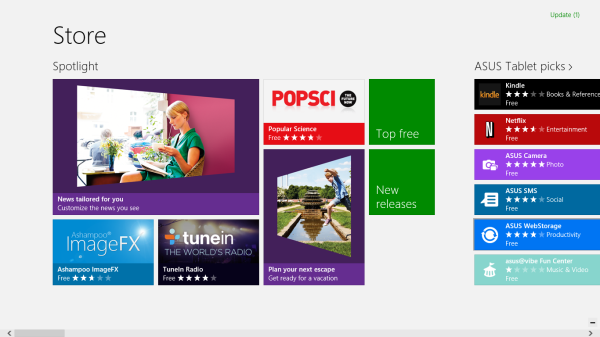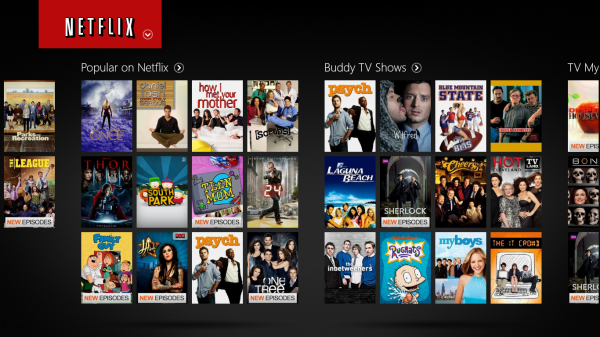The Windows RT Review
by Vivek Gowri & Anand Lal Shimpi on October 25, 2012 12:00 PM EST- Posted in
- Windows RT
- Operating Systems
- Microsoft
- Mobile
- Windows 8
- Tablets
Windows Store and the 3rd Party App Situation
So the third party app situation, out of the gate, is the biggest issue I can see with Windows RT. Obviously, with ARM processors, typical x86 legacy programs are out, so you’re forced to rely exclusively on the Windows Store for third-party applications. Within the Windows Store itself, almost all of the applications are compatible with both x86 and ARM architectures - Microsoft claims around 90% off the apps on the Windows Store at launch are compatible with both Windows 8 and Windows RT, and it appears that a lot of developers will be releasing applications on the Store for both platforms simultaneously.
The problem is that currently, there aren’t that many apps, and of them, not many are very good. Obviously, we’re still a couple of days from launch and I’m expecting a significant uptick in the number of quality apps on the 26th particularly, but also over the coming weeks and months. As the new versions of Windows gain market share, the Store will grow and mature.
Let’s talk about the Store itself. It’s a bit of a mixed bag. Yes, the Metro visual style looks great here, as it does almost everywhere else. Metro just lends itself well to anything involving lots of rectangular pictures (or app icons, in this case). Unfortunately, the Store is a bit poorly organized, and it’s difficult to find really relevant applications. The “Top Free” list needs a “Top Paid” companion, and there absolutely needs to be a “Sort by most reviews” option. Those two things would make it significantly easier to find the high-volume, headlining applications in any given category. I also really, really want the option to see all applications made by a specific developer (like, say, Microsoft.) The inability to do so is a pretty significant oversight from where I stand. These are all pretty simple fixes, just a few extra organizational options that would go a long way to making the store easier to navigate.
For right now, the best apps I can recommend on the Store are staples like Kindle, Netflix, Evernote, and Wikipedia, along with news and shopping apps from USA Today, NBC News, eBay, Newegg, and Popular Science. Other notable applications include IM+ and a number of internet radio apps like iHeartRadio, TuneIn Radio, and Slacker. In addition to those and a number of applications and games from Microsoft and Microsoft Studios - Xbox SmartGlass, Fresh Paint (a new paint application), OneNote MX (the Metro redesign of OneNote, still a preview), the Modern UI version of Remote Desktop, Reckless Racing, Hydro Thunder, etc - there’s not much out there, except maybe Fruit Ninja.
There’s still a lot of 3rd party stand-ins for applications that will get first party support, like a BBC News application actually developed by BBC and things like that. These independent apps can sometimes be good, but are almost always outdone by the first party ones. It’s just a matter of design and quality. I know that ESPN is slowly but surely bringing out their suite of applications - their cricket and football (soccer) apps were both released recently, which indicates that Scorecenter and their other applications for online radio and live video will all hit the store in the near future, but they’re just one developer. I just don’t know how much time it will take for a majority of those applications to be released. Skype isn’t currently available in the store, but will be on the 26th, which makes me wonder how many new applications will hit Windows Store in time to coincide with the official launch date of Windows 8. I want to revisit this a week from now, or even just two days from now, to see where things stand.
I’ve seen a lot of early reviews of Windows RT-based tablets decry the app situation, but I’m assuming the growth will occur significantly more quickly than it has for, say, Windows Phone, for one simple reason: this is still Windows. A very different kind of Windows, yes, but it’s not like people will stop buying Windows computers. Windows Phone has had issues gaining marketshare over the last two years, but starting tomorrow, 85% (or more) of computers being sold worldwide will be running either Windows 8 or Windows RT. There are too many people out there with new Windows systems for developers to somehow just stop releasing Windows applications.
It's important to remember that devs aren’t creating apps for Windows RT specifically, they’re creating new applications for the new Windows UI, which just happens to cover two very different hardware platforms. Nobody worries about the state of Windows 8 applications because all of the legacy desktop apps will still work, but the Windows Store will develop and mature at the same pace regardless of whether you’re looking at Windows 8 or Windows RT. Everyone worrying about Windows RT tablets and third party apps should have the same concerns about touch-centric apps for Windows 8 tablets.
But regardless, we’re still missing some huge applications at this point: Facebook, Twitter (though Rowi makes for a good stand-in), Dropbox, Pandora, Yelp, any kind of Google service, anything from Adobe, and generally useful but not necessarily headlining financial and bank-specific apps. Check back with us in a few days, because I don’t think the Windows Store will stay as sparsely populated as it is currently, but until that changes, there will be questions.












233 Comments
View All Comments
steven75 - Friday, November 2, 2012 - link
Yes, agreed 100%. This review seems to be by far the most certain the *metro* apps are going to grow by leaps and bounds than any other review I've read. I think there's definitely a chance RT and thus metro apps aren't going to take off at all.karasaj - Thursday, October 25, 2012 - link
Forgot to say thanks, great review! I was wondering about the smoothness of Surface etc - it doesn't seem like there will be much to worry about. Thanks again!nedjinski - Thursday, October 25, 2012 - link
Thanks for yet another sane and unbiased review. I find this approach the most helpful when considering a new purchase. You guys continue to have clear vision when it comes to the big picture and you don't get distracted by small details that will probably get ironed out in future iterations of the device.It looks like MS has a winner here.
Netscorer - Thursday, October 25, 2012 - link
While this is an overall very good and comprehensive review, I am still confused by two separate Windows 8 OS (with Windows Mobile 8 may be third). I just don't see how they are going to coexist long term. And if there will be convergence, which OS will be left out.I was hoping review would touch on those issues a bit more then spending page after page describing various apps that come built in and will undergo a significant change/enhancement shortly anyway.
haukionkannel - Thursday, October 25, 2012 - link
Well the Metro UI aplication will be very popular in Mobile platforms. Because both windows 8 versions can run those, there is no problem in there. If you want to run normal desktop application, video editing, AAA games, the normal 86 version of win8 is for you.If you have to chose between normal win8 and win8 RT pad, or tablet there is not very big difference. In most cases it is better for programmers to make Moder UI version of their program than to make only Intel CPU based version that runs only in normal win8 version. Thre will be more customers in Modern UI platform than normal. So instead of having bottle neck with old gaming consoles, the new botleneck will be the slovest win8 RT pad in most cases.
If you are serious gamer the normal win8 is for you. If you are interested in just getting pad for playing casual games like Angry bird, and reading www-pages, listening music, looking viodeos, etc, it does not matter what you get, if the price is good and ahrdware desent.
AmdInside - Thursday, October 25, 2012 - link
Waiting for MAME to be available for either Windows RT or Windows 8 before I buy a tablet.ludikraut - Thursday, October 25, 2012 - link
Oh yeah, MAME on a tablet will rock.l8r)
jecastejon - Thursday, October 25, 2012 - link
I am interested, reading and taking notes but is this Windows RT a netbook-nettop OS at a higher price point?I think I will wait at least 2-4 years to consider an ARM-Atom based computer to produce even some light work, as for a device to have fun there are tablets, Nintendo, PSP, iDevices with thousands of apps or games. WRT is not that cool, it does nothing better as an entertaining system but it may be great to produce very light or limited work on the office and just probably on the go but even for that it will need to compete with entry-laptops and ultralight machines.
Right now this is a very hybrid concept targeting for a broad marked but I just can see a niche market I am sure it will reach. I think in part the price is to high and it will be kind of a business ultra light high end system.
diamondsw2 - Thursday, October 25, 2012 - link
"85% (or more) of computers being sold worldwide"I assume you're not including iPad sales - which is very misleading for a tablet OS review. And if you're more broadly talking Windows 8 all of a sudden (RT != 8), the overwhelming majority of Windows sales are to businesses - and those businesses are going to exercise their downgrade rights and not touch Windows 8 with a ten-foot pole. There's no business case for it over Windows 7, and the training is far from insignificant. It's not going to get any headway there for years.
Consider be very skeptical on actual uptake of Windows 8 or its supposed marketshare. I'll bet it's six months to a year before I see the first person using it (which may say more about how many of my PC-using friends have converted to iPads and Macs). I fully expect every Windows PC I see to be on 7 for a long time to come).
PsychoPif - Thursday, October 25, 2012 - link
Just from a quick search, I've found that Apple sold 15.4m IPad vs 49.8m for the top 4 OEM. It does'nt include the other manufacturer and it's still 70% marketshare.85% might be high, but don't make it sound like Windows won't be on the vast majority of computer sold this year.